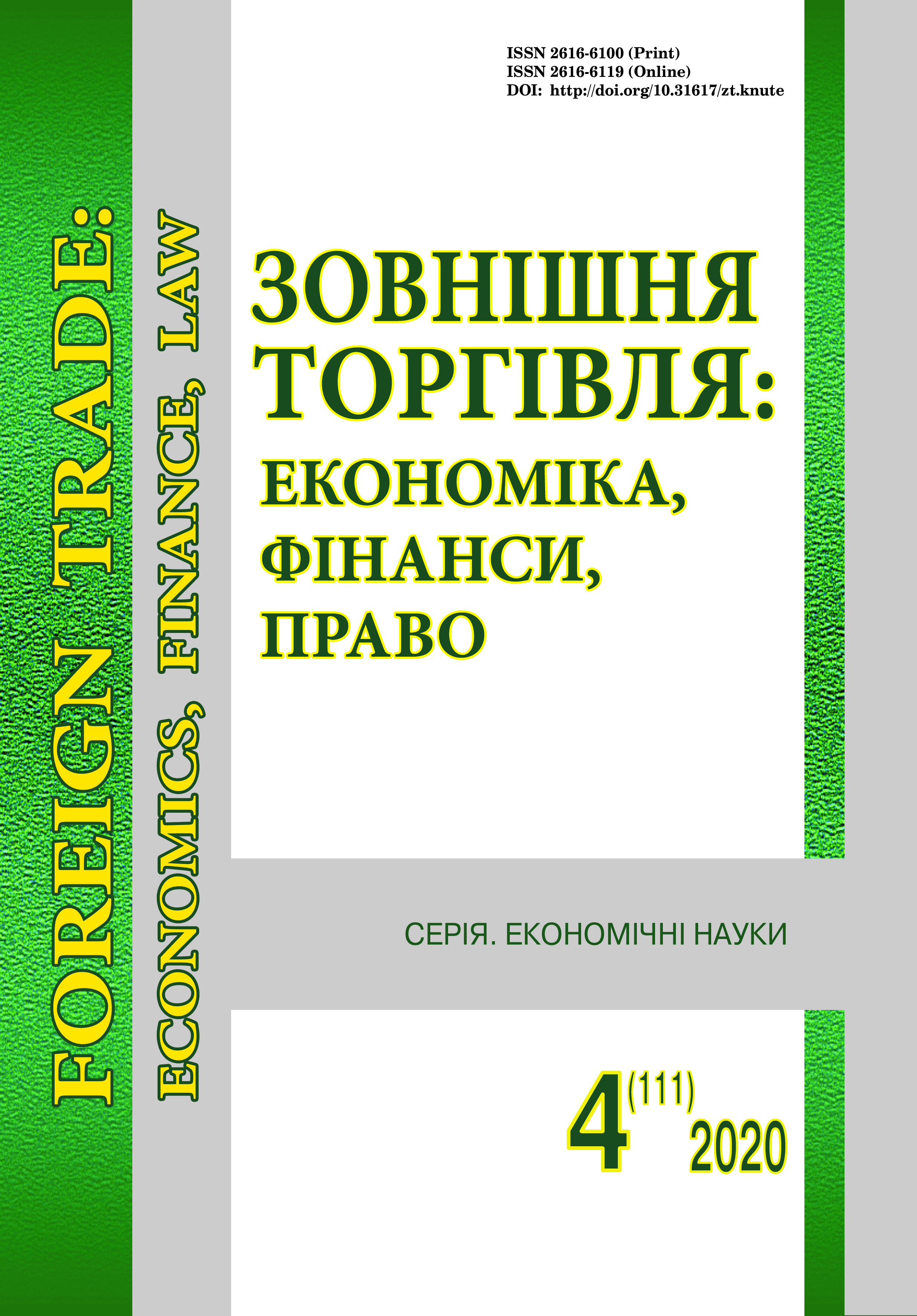Artificial intelligence in marketing activities
DOI:
https://doi.org/10.31617/zt.knute.2020(111)09Keywords:
artificial intelligence, personalization of consumers, machine learning, marketing functions, content generation, transformational processes.Abstract
Background. The main purpose of marketing is to influence purchasing decisions. To do this, marketers need to know the mechanisms, principles and rules of the decision-making process by customers and influence them to the maximum benefit for the company. Thus, today one of the most important trends in business today is the steady growth of artificial intelligence, which already affects every area of the business world.
The analysis of recent research and publications has shown that despite the availability of some scientific achievements, the issues of introducing the concepts and models of STI as a form of direct marketing into the marketing activities of retail enterprises remain insufficiently studied.
The aim of the paper is to study the impact of artificial intelligence tools on the marketing activities of retailers for a deeper understanding of consumers and personalization of advertising campaigns and messages.
Materials and methods. In the course of the research scientific publications in domestic and foreign periodicals were used, as well as general scientific methods of cognition, namely: historical-logical, synthesis, comparative and system analysis, systematization, etc.
Results. The paper is devoted to revealing the essence of artificial intelligence in marketing activities in order to better understand the needs of consumers. The steady growth of artificial intelligence as the most important trend of modern business has been identified. The definition of artificial intelligence in marketing is identified as a method of using customer data and concepts of artificial intelligence such as machine learning to predict the next step of the consumer and meet his needs. The main tools of artificial intelligence, which are used by large corporations for a deep understanding of consumers, are studied. There are two main types of chat-bots designed to meet the goals of consumers and communicate with users. The main stages of using artificial intelligence in the marketing activities of retail operators are considered. The transformational processes of marketing functions of retail operators under the influence of machine learning are characterized. The most significant areas of transformation of marketing functions are formulated.
Conclusion. Thus, the basis of a deep understanding of consumers is the introduction of retail marketing artificial intelligence as a form of direct marketing, which uses methods of database marketing, as well as concepts and models of STI, such as machine learning. Direct marketing can increase the effectiveness of understanding consumer psychology by focusing on the right customer.
Artificial intelligence allows marketers to interact with consumers at every stage of the buying and selling process, based on personalized information about the geography, demographic status, needs, preferences of consumers. Understanding consumer psychology will increase the effectiveness of marketing by simplifying their distribution into individual groups, which will provide additional segmentation in niches with a high targeting.
References
Barden, F. (2017). Kod zlamano, abo Nauka pro te, shho zmushuje kupuvaty [The code is broken, or the science of what makes you buy] Kharkiv: Klub Simejnogho Dozvillja [in Ukrainian].
Kietzmann, J. P., & Emily, J. T. (2018). Artificial Intelligence in Advertising: How Marketers Can Leverage Artificial Intelligence Along the Consumer Journey. Journal of Advertising Research, 58, 263-267 [in English]. https://doi.org/10.2501/JAR-2018-035
Wirth, N. (2018). Hello marketing, what canartificial in telligence help you with? International Journal of Market Research, 60 (5), 435-438 [in English]. https://doi.org/10.1177/1470785318776841
Rekha, M., & Asharaf, S. (2016). Artificial Intelligence Marketing: Anapplication of a novel Lightly Trained Support Vector Data Description. Journal of Information and Optimization Sciences, 37(5), 681-691 [in English]. https://doi.org/10.1080/02522667.2016.1191186
Tjepkema, L. (2017). What Is Artificial Intelligence Marketing & Why Is It So Powerful? Retrieved from: https://www.emarsys.com/en/resources/blog/artificial-intelligence-marketing-solutions [in English].
Judina, N. V. (2016). «Dorozhnja karta» pidpryjemstva u konteksti futurologhiji tekhnoghennoji ekonomiky. Tradyciji i innovaciji. Innovaciji ta fundamentaljni nauky v umovakh tekhnoghennoji ekonomiky: zbirnyk Materialiv mizhdyscyplinarnoji naukovo-praktychnoji konferenciji [«Roadmap» of the enterprise in the context of futurology of the technogenic economy. Traditions and innovations. Innovation and fundamental sciences in the technogenic economy: a collection of Proceedings of the Interdisciplinary Scientific and Practical Conference] (Kyjiv, 25.11.2016). Retrieved from http://futurolog.com.ua/publish/2/Zbirnyk.pdf#page=6 [in Ukrainian].
Mullan, E. (2018). The Uses of Artificial Intelligence to Marketers. Retrieved from: https://blog.hurree.co/blog/what-is-artificial-intelligence-marketing [in English].
Riikkinen, M., Saarijärvi, H., Sarlin, P., & Lähteenmäki, I. (2018). Us ingartificial in telligence to create value in insurance. International Journal of Bank Marketing, 36(6), 1145-11.68 [in English]. https://doi.org/10.1108/IJBM-01-2017-0015
Solobozov, O. (2018). 5 prichin, pochemu mashinnoe obuchenie – eto budushchee marketinga [5 reasons why machine learning is the future of marketing]. Retrieved from https://www.criteo.com/ru/insights/5-prichin-pochemu-mashinnoe-obuchenie-eto-budushhee-marketinga [in Ukrainian].
Yudina, N. (2013). Marketynghovi aspekty futurologhichnykh naslidkiv tekhnologhizaciji [Marketing Aspects of Futurological Implications of Technologization] Ekonomika. Upravlinnja. Innovaciji: elektronne fakhove vydannja - Economy. Management. Innovation: an electronic professional edition, 1. Retrieved from http://nbuv.gov.ua/UJRN/eui_2013_1_71 [in Ukrainian].
Lemesh, E. (2012). Social CRM: upravlyaya opytom klienta [Social CRM: Managing customer experience] Marketing-gazeta: elektronnoe izdanie Ukrainskoy Assotsiatsii Marketinga - Marketing Newspaper: electronic edition of the Ukrainian Marketing Association, July, 2–3. Retrieved from http://www.uam.in.ua/rus/projects/marketing-newspaper/arhive.php [in Russian].
McDonald, M (2000). Strategicheskoe planirovanie marketinga [Strategic Marketing Planning] SPb.: Pyter [in Russian].
Mur, D. (2006). Preodolenie propasti: marketing i prodazha khaytek-produktov massovomu potrebitelyu [Bridging the Gap: Marketing and Selling High-Tech Products to the Consumer] Moscow: Vil'yams [in Russian].
Additional Files
Published
How to Cite
Issue
Section
License
Copyright (c) 2022 Foreign trade: Economics, Finance, Law

This work is licensed under a Creative Commons Attribution 4.0 International License.
This work is licensed under a Creative Commons Attribution 4.0 International (CC BY 4.0)







